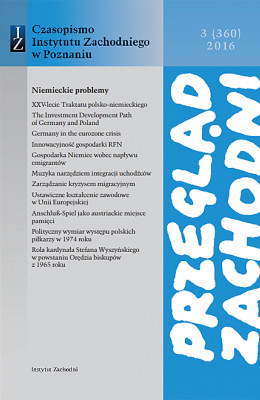The role of Germany in the eurozone crisis – pragmatic rescuer or power-hungry torturer? An „Austrian” perspective
The role of Germany in the eurozone crisis – pragmatic rescuer or power-hungry torturer? An „Austrian” perspective
Author(s): Juergen WandelSubject(s): Economy, National Economy, Supranational / Global Economy, Economic policy, International relations/trade, EU-Accession / EU-DEvelopment, Financial Markets
Published by: Instytut Zachodni im. Zygmunta Wojciechowskiego
Keywords: Germany; European Monetary Union; Austrian business cycle theory; monetary policy
Summary/Abstract: Germany’s role in the eurozone crisis is a subject of debate. Does Europe’s largest economy act pragmatically and lend a helping hand to the crisis countries or does its fixation on austerity and structural reforms prevent their discovery? This article discusses this question using the business cycle theory of the Austrian School of Economics as normative benchmark. It is argued that Germany’s insistence on fiscal discipline and market-oriented reforms is basically in line with the normative conclusions of this theory, while the reforms suggested for the monetary system fail to adequately solve the crucial problem which is seen in the high politicization of this sector. It is shown that Germany only partially succeeded in implementing its policy preferences in the eurozone’s anti-crisis policy. This only holds for its claim for austerity and structural reforms, whereas it has not been influential enough to prevent the European Central Bank’s counterproductive ultra-loose monetary policy and its enlargement of power. It is contended that in the eurozone crisis Germany has so far performed the role of a pragmatic rescuer rather than of a merciless tormentor.
Journal: Przegląd Zachodni
- Issue Year: 360/2016
- Issue No: 03
- Page Range: 33-61
- Page Count: 29
- Language: English

